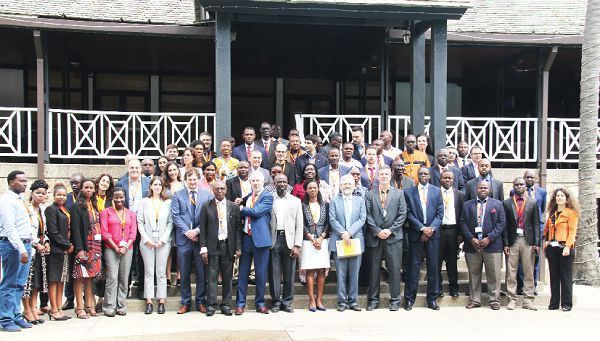
Reducing cost of remittances, IOM leads process
Migration provides immense opportunity and benefits – for migrants, host communities and communities of origin.
According to the International Organisation for Migration (IOM), the link between migration and development could best be realised if migration was well managed.
Advertisement
One key element of focus on the issue of migration and development is remittances, which is the money migrants send home to family and friends. Each year, huge amounts of money are transferred across national boundaries by migrant workers.
In 2012, over $500 billion in remittances was reported. Out of this amount, $400 billion went to developing countries, making migrant remittances a key component of the economy of developing countries. Globally, remittance flows reached USD 613 billion in 2016, with Nigeria being one of the top five remittance-receiving countries.
The World Bank reports that remittances are now more than three times the size of official development assistance.
Unfortunately, the cost of sending money to low and middle-income countries remain high at 7.1 per cent in the first quarter of 2018.
According to the Regional Director of the IOM Office for East and the Horn of Africa, Mr Jeffrey Labovitzd, Sub-Saharan Africa remained the most expensive place in the world to send money with an average cost of 9.4 per cent of the transfer amount, which was way above the Sustainable Development Goal (SDG) target 10.C.3 of reducing it to less than three per cent, the transaction costs of migrant remittances by 2030.
Thematic meeting
It is in view of these challenges that a three-day regional thematic meeting on remittances in Sub-Saharan Africa was held in Accra to create a platform for information sharing and exchange of learning for 80 participants involved in IOM’s African, Caribbean and Pacific and European Union Migration Action.
It was made up of migration experts and representatives from African Caribbean Pacific (ACP) governments, regional organisations, the European Union, UN agencies and NGOs working in the area of remittances and diaspora mobilisation.
They sought to find solutions for the Sub-Saharan region and establish links between the outcomes of the ACP-EU Migration Action Programme and processes relevant to the ACP-EU Dialogue on Migration and Development at the regional and global levels.
Finding an antidote to the cost challenges associated with migration and transfer costs would go a long way to assist Sub-Saharan Africa.
In his submission at its meeting, the Director of the Diasporan Affairs Office, Office of the President, Mr Akwasi Awuah Ababio, said reducing the cost of remittances to Ghana was very significant to the government which, he said, was bent on eliminating corridors that induced costs.
The requisite follow-ups should be pursued at the joint ACP and EU Dialogue, as well as the application of the SDGs and the GCM and to pursue a more in-depth dialogue on remittances.
Remittances are an important contributing factor to poverty reduction.
Remittances undoubtedly lift the families of many migrants out of poverty, paying for basic needs, education, enhancing their ability to withstand risks related to unemployment or illness, and building their resilience to external events such as climate change or humanitarian crises.
The 2030 Agenda for Sustainable Development sets a specific target (10.c) for SDG Goal 10.



